Stormy times ahead in the North Sea
- Published
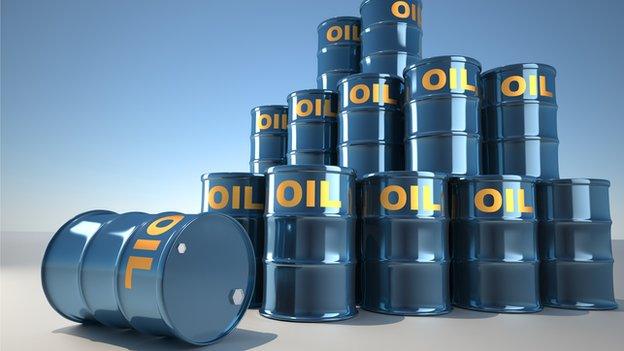
Remember: the oil price can go up as well as down. Falling through $50 per barrel is being given the sense of a historic low. Yet only seven years ago, Brent crude peaked above $145, and sank below $40 in one tumultuous year.
So we've been here before. We should know by now that the oil price is notoriously volatile. And the pressures that bring it down can create the conditions to make it rise again.
You can hear more about why it's been falling recently.
You can read here how it's feeding through - or not - to prices.
We're told the UK Treasury is watching to see the big energy utilities drop their charges as wholesale energy costs fall. They may not get the candid answer that they're holding them up in case Ed Miliband becomes prime minister, with a pledge to impose a price freeze.
You can also read here about who gains and who loses internationally. In short, the ones with most to fear use their oil revenue to fund very large chunks of their government spending. Iran, Russia, Venezuela and Nigeria are among the most vulnerable on that score.
Others with a lot to fear have the environment in mind. Cheaper oil means more of it will be burned. For that reason, this could be a good time to introduce carbon trading, and to re-introduce an accelerator on petrol tax. But don't hold your breath for that.
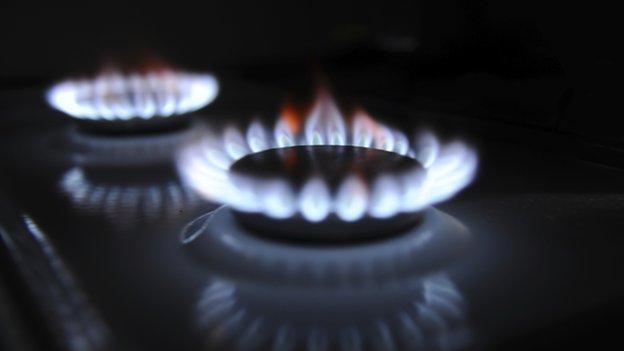
The government wants to see energy firms drop their prices to consumers
The ones with most to gain have to foot big foreign exchange bills to import their energy, including India, Turkey and Japan. Cheaper energy should give them a growth boost.
And as more of the world depends on imported oil than depends on producing and exporting it, the net impact should be a boost to global growth of, very roughly, 0.1% of output for every $10 drop in the price.
But what price instability? Stock markets don't like the impact on oil companies and their supply chains. A destabilised Russia, Iran or Arab exporters could bring positive political results, but that's far from guaranteed.
And what about an economy that uses a lot of oil, but also produces it. Britain's, for instance? And Scotland's?
Gainers and loser
There are probably more gainers than losers in Britain. But many of the potential losers from the falling oil price are heavily concentrated in the north-east of Scotland.
According to Professor Brian Ashcroft, external, an economist at Strathclyde University, it's hard to say what the net effect will be on the Scottish economy, but that Scotland's position relative to the rest of the UK will deteriorate.
He also suggests the renewable energy sector will suffer in the short to medium term, as its costs, relative to fossil fuels, will become higher. Again, Scotland has a bigger footprint in that industry, so can be expected to suffer a bigger impact.
Tax from offshore production will fall, but growth in the oil-consuming part of the economy could offset that. And worldwide, such growth could raise demand for oil, and therefore its price could bounce back.
Vulnerable
In and around Aberdeen, even though the industry has done well to diversify into exports of oilfield services and subsea specialisms, those export markets are in trouble too, as it's the offshore drilling that tends to be most expensive worldwide, and hence more likely to pull back on spending while the price is low.
The North Sea itself looks particularly vulnerable in this downturn. It has weathered sharp changes before. But the industry is now at a turning point. Mature fields are depleting and the remaining oil and gas is getting more expensive to extract.
New fields offer new and expensive challenges - in deep water, or requiring new technologies to handle difficult geology, high pressure and high temperatures.
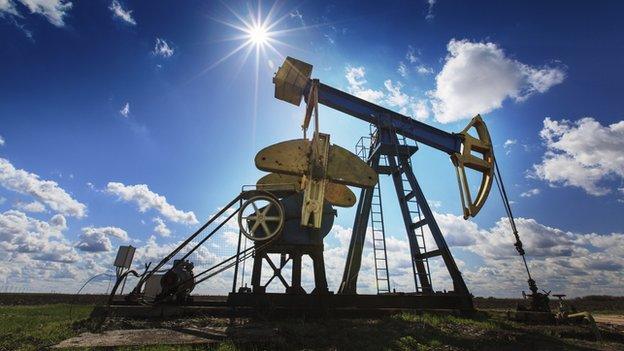
Opec may be attempting to force higher-cost American shale frackers out of business
And while Britain is still among the world's top 30 producers, it's now seen as one of the more expensive places to operate, given a black mark by the industry for three unexpected tax hikes in the past 15 years.
With a sharp decline in exploratory drilling, higher costs and poor recent results when it's tried, the replacement rate of reserves also looks downbeat.
Volatile costs
To put some numbers to those trends, the most recent assessment by industry body Oil and Gas UK showed:
- UK production has more than halved since 2004.
- While the rate of decline fell to 8% in 2013, the total cost of production rose 15% to £8.9bn, and was expected to reach £9.5bn last year.
- The cost of producing the average barrel of oil in UK waters rose by 62% between 2011 and last year.
- While 50 fields in 2013 produced oil (these figures include the gas equivalent) for less than £10 per barrel, 19 fields had operating costs above £30 per barrel - very close to the dollar price now reached.
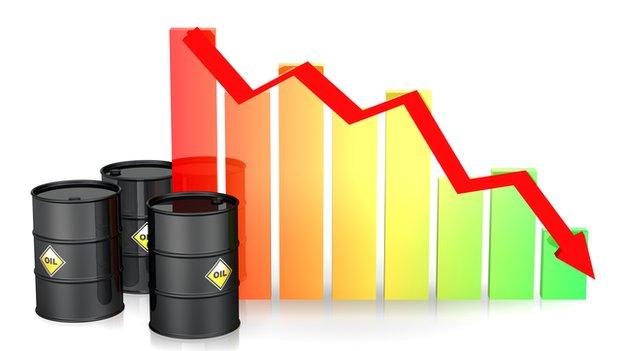
The price of oil has plummeted to less than $50 a barrel in recent months
Now, one of the reasons costs have gone up is because the industry suffers from volatile costs as well as prices.
The price of hiring a drilling rig is very volatile, and has recently fallen. Offshore workers' pay can go up fast, particularly where there's a skill shortage, just as contractors are now having pay cut.
So the cost per barrel may be coming down. But that will be true also of other oil basins, where they haven't been rising so fast. And with scarce investment resources, oil companies can be expected to go where returns are most attractive.
Use it or lose it
There's another reason UK costs have been rising. Those mature fields have old equipment. It's more difficult and costly to maintain, meaning production has been halted more often than expected.
If it becomes uneconomic to use, the temptation will be for operators to plug and abandon oil fields earlier than previously planned. This is not equipment that can be easily mothballed, or the taps turned off, as in the Arabian desert. Offshore drillers use it or lose it to corrosion.
That's where the UK's new strategy for 'maximising economic recovery', written for the government by industry grandee Sir Ian Wood, faces much bigger challenges than Sir Ian thought when he published last summer.
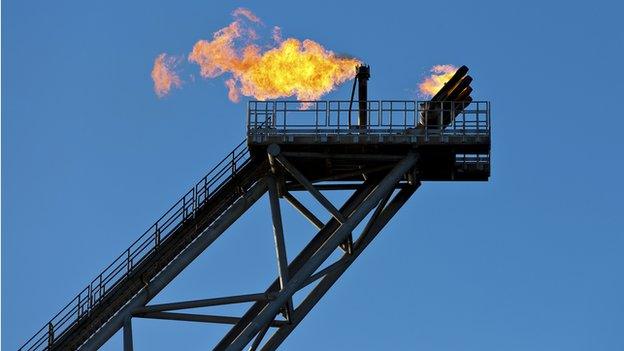
North Sea operators could be tempted to plug their fields early if they become unprofitable
He said the oil companies had to co-operate more, on sharing facilities and equipment; that a tougher regulator should force companies to keep producing in marginal fields, or risk losing their licences; and that the Treasury had to revamp the tax regime to create the incentives to maintain UK waters as an attractive place to invest.
The regulator is being set up. Its boss has just started work, though Scots lawyers, at the Faculty of Advocates, have this week warned that it carries significant risk of conflicts of interest as it's currently envisaged.
In last month's Autumn Statement, George Osborne set out on a course to big tax changes, but with only small steps. Now the oil price has declined sharply, the pressure is now much more intense to get those incentives in place quickly.
There's only so much delay can be expected in business investment decisions, as well as field closure decisions, while the Treasury cogitates.
Frackers
So yes, after this fall, the oil price may well go up again. Once the Saudis have squeezed enough higher-cost American shale frackers out of business, the OPEC exporters cartel - led from Riyadh - can take back some control and constrain supply, to push the price up again.
But if it doesn't happen soon, it could have done irreparable damage to mature parts of the North Sea industry.
Apart from tax changes, what can be done? As we'll probably hear from MSPs in a debate about this today, Holyrood has a lot of power over the north east's infrastructure and skills.
From the business perspective, Aberdeen's ring road is long overdue. It's now under construction. Rail connections could be improved.
Recent wage inflation for oil and gas industry workers was becoming a concern, pointing to a need to raise the number of Scots with the necessary technical know-how.
A downturn now will take that pressure off, and may help some other Scottish industries which compete for workers with those skills. But don't be surprised if an upturn brings back skill shortages. These people are wanted around the world.

Some experts believe the bubble has burst on the North Sea cash cow
In an election year, what response have we seen so far? Asked about it earlier this week, First Minister Nicola Sturgeon pinned her hopes on the price rising again.
And asked about the impact on the spending plans if Scotland had been independent, she observed that she wouldn't wish to start from where we are, but with a large Norwegian-style trust fund.
The new Labour leader, Jim Murphy, was in Aberdeen to call for a rainy day fund to handle industry downturns. That could be a bit like the fund which Labour and Conservative governments didn't set up with oil revenues in the boom years.
According to oil experts, the adjustment all politicians may have to make is to lower their expectations of what the industry can provide in tax.
As Colin Pearson colourfully put it to the BBC this week, it's been seen as a cash cow, but he thinks that bubble has burst.